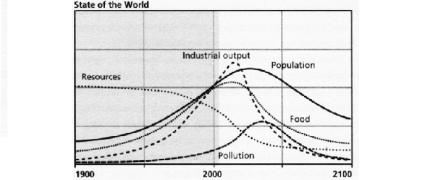
A scenario calculated back in 1972. Source: The Limits to Growth (Meadows et al., 1972)
While economic growth has proven to be beneficial, especially in high income countries, when pursued indefinitely it carries a burden. As it becomes harder to reach, economies are following a more aggressive pursuit of growth. This comes at the expenses of the more disadvantaged and vulnerable populations, dividing society and entrenching inequality. Furthermore, in a world with a growing population, finite land and limited resources, incessant economic growth in search for increasing individual wealth and consumerism has become not only detrimental to society but also to the environment through resource depletion and pollution.
Professors Peter Victor and Tim Jackson believe governments and corporations are not considering the well-being of society enough and are failing to provide us with a sustainable quality of life. That’s why they spent the last several years collaboratively to develop the LowGrow SFC !!
LowGrow SFC is a model that helps assess the effects of changes in control variables such as carbon pricing or a reduction in working hours, and how these decisions can take us to diverse development paths with different economic, social and environmental consequences! Built with real data from Canada, the resulting scenarios generated are also relevant for similar advanced economies and take into consideration economic, environmental, energy, social, and financial aspects.
Descriptive rather than predictive, the results and new scenarios are meant to encourage debate around a different path. Have you chosen one already?